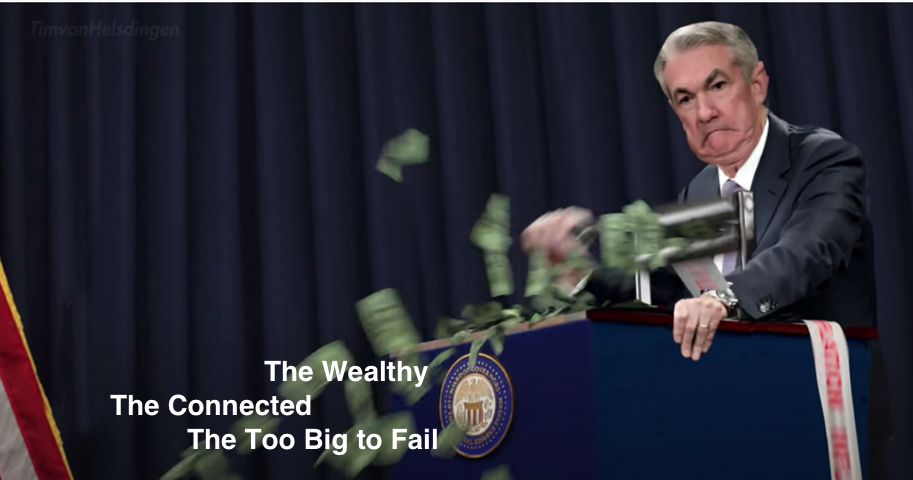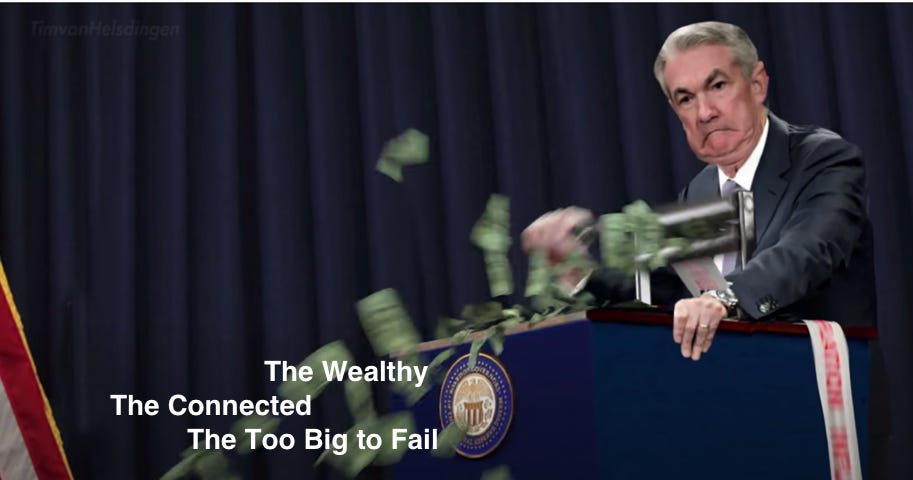Dear Crypto Natives,
Money is a scarcity game.
It’s important that the game remain fair.
Why?
Money systems that aren’t fair lose credibility. People switch, they fork, they revolt.
In the ashes of every hyperinflation there’s a money system that’s lost its credibility.

(Above) Kids playing with stacks of hyperinflated currency during the Weimar Republic 1922
No, I don’t expect wartime hyperinflation in developed countries yet. But losing a war isn’t the only way to lose credibility.
The fairness of a fiat money can slowly erode overtime—or it can erode fast in punctuated shocks. We’re in the midst of a punctuated shock now as the U.S. prints trillions to “stabilize the economy.”
What’s the the cost of this money printing?
They don’t talk about it much, but there is a price to pay for the money printing.
No, it’s not inflation. (That comes later.)
The cost is fairness. An open window for corruption. The loss of credible neutrality.
By giving liquidity to central banks the Fed favors certain countries over others.
By buying corporate bonds the Fed favors large companies over small.
By buying stocks the Fed favors the speculators over the prudent.
By bailing out Wall Street the Fed favors the oligarchs over the people.
It doesn’t matter if the 12-members of the Fed are somehow impervious to political influence and corruption (they’re not btw). Even if this system was run by impartial angels of justice the clumsiness of tools available and the imperfections of central planning inevitably leads to unequal outcomes.
Take this example: yes the U.S. is providing loans to its small business—but even accessing these loans requires bank connections—the small businesses with good banking connections are first in line. Those without them will perish.
And compare these small business loans to the way money is shoveled into the mouths of large US corporations listed on public bond markets—the Fed is literally buying their debt directly! Even junk debt. They don’t even have to fill out paperwork!
The lesson?
It’s not work hard and build something people value. It’s be big, be wealthy, have connections—and this is important—position yourself as close to the gushing money spigot of the Fed as possible.

Oh, and also be America’s political ally. (They’ll shut you out otherwise)
How fair is this system to outsiders? How would mainstreet rate this system? How about the restaurant owner down the street? How about China?
When given the opportunity the outsiders of this system will opt-out. And they’ll do one of two things. They'll either:
- opt into a new system that gives them the power
or - they’ll opt into a new system where no one has the power
Crypto is a bet that a portion of the world chooses the second option.
Crypto money is a scarcity game that’s fair.
- Issuance—by algorithm maintained by social contract
- Network—permissionless with no gatekeepers
- Access—anyone with internet connection no jurisdictions
- Rules—transparent and embedded in code
DeFi on Ethereum takes these ideals to their logical conclusion by creating an entire financial system that’s credibly neutral and available to the world as a public good—no bank required.
Of course there are other credibly neutral money systems we could return to. The gold standard is one—but gold has been captured by central bankers in the past. It’s not digital, it’s not programmable, it’s not internet native, it’s not bankless.
If the 21st century wants a neutral money system it has to be those things. It has to operate in new digital world of 1s and 0s not in the old Victorian world of railroads and steam engines.
Going bankless means getting positioned for this future.
A future where the costs of money printing are paid…and the world opts-out.
Strap in—it’s gonna be a hell of a decade.
- RSA
P.S. Listen to today’s Bankless podcast to learn about the scarcity games of ETH and BTC
